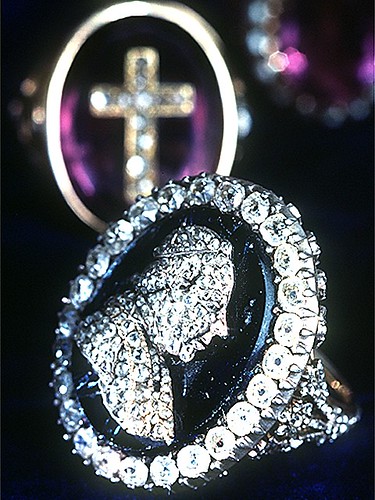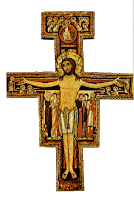
This is, perhaps, a bit more of a serious post than my lighthearted usual posts. It deals with the topic of mental illness. I have been fortunate to have many friends in the psychiatric profession and done significant personal research into this issue. Clergy with mental illness are nothing new. There are numerous examples, in the past, of clergy who have suffered some type of infirmity. For example, modern psychiatric professionals regard Pope Pius IX to have possibly suffered from extreme narcissism or bipolar mania (grandiosity). An example of this is his ring, displayed at the right, which he had set with a cameo image of himself in diamonds.
There were also various saints who, while often displaying holiness of life, had what we now identify as a mental illness. In fact, there can often be a fine line between mental illness and holiness. One man's hallucination is another's vision! This is precisely why it is so important to test the spirit as directed in the Gospel of John ("Beloved, do not believe every spirit, but test the spirits to see whether they are from God..".)
Mental illness among clergy is now being addressed. With 500,000 clergy persons in the United States alone (between Protestant, Catholic, and Jewish clergy) it is statistically impossible not to have a segment who are mentally ill. Some are able to receive appropriate treatment, while others are asked to leave. This does not have to manifest itself so visibly as sexual misconduct--it can be inappropriate displays of anger, inability to feel empathy, delusions, paranoia, phantom illness, etc.
The ISM is complicated because we do not have a unilateral system for psychological testing. I cannot beg and implore jurisdictions enough to REQUIRE PSYCHOLOGICAL TESTING. It can be relatively inexpensive and is absolutely essential to not opening up the jurisdiction the ordaining bishop to lawsuits. It must complement a criminal background check. Even if it can't be universally implemented for all candidates, if there is any question about a candidate from the bishop he should reserve the right to request testing.
I have believed and continued to believe in the goodness of sincere, good people who have been prevented ordination in other churches finding somewhere to minister in the ISM. Because I may not agree with their candidacy does not mean that they cannot share God's love with others. However, there are some people who either cannot be ordained because it is dangerous to the general public or who need treatment from medicine or therapy to manage their illness before they are able to minister. Unfortunately, so much stigma surrounds mental illness that they may not be comfortable being honest about their issues.
People of faith and clergy should be vigilant about issues of mental illness. There are certain warning signs that are evident. Studies have pointed to the hypothesis that gay men and women may be more susceptible to borderline personality disorder. This can be apparent in intense personal relationships, addictions, frequent created illnesses, abandonment fears, etc. Men in general may be more susceptible to antisocial personality disorder and may display a lack of remorse, aggressiveness, deception, etc. Narcissism and other personality disorders may present themselves as well.
The more we can be open about the issue of mental illness the better we can understand clergy we know or who may seek ordination. Again, it is not a shameful issue but one which presents in every profession, race, gender, sexual orientation, etc.


















